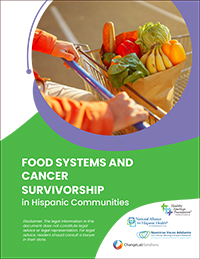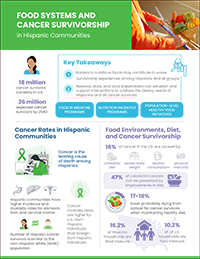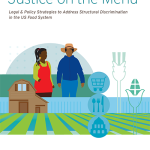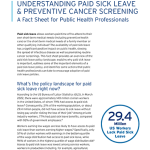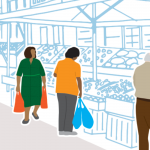Food Systems & Cancer Survivorship in Hispanic Communities
Solutions for healthy food access
Healthy, nutritious food is critical to cancer treatment and survivorship, yet millions of people battling cancer are also fighting to obtain basics like nutritious, affordable food.
A report and infographic released by the National Alliance for Hispanic Health offer critical insights and actionable information to help policymakers and advocates better support Hispanic cancer survivors. The data and recommendations in these documents highlight the urgent need for coordinated efforts at local, state, and national levels to address the dietary needs of Hispanic cancer survivors. These resources were developed by Nuestras Voces Adelante and the Healthy Americas Foundation in collaboration with ChangeLab Solutions.
Food Systems and Cancer Survivorship in Hispanic Communities - Report
- Provides a comprehensive analysis of the barriers that Hispanic cancer survivors face in accessing nutritious foods
- Discusses the role of Food Is Medicine programs, nutrition incentive programs, and population-level healthy food initiatives
- Highlights key data, such as the expected increase in cancer survivors to 26 million by 2040 and the higher incidence and mortality rates of certain cancers in some Hispanic communities
- Includes policy recommendations and case studies to guide stakeholders in creating more equitable food systems
Food Systems and Cancer Survivorship in Hispanic Communities - Infographic
- Summarizes the main points from the full report in a visually engaging and easy-to-understand format
- Emphasizes the importance of healthy food access and its impact on cancer survivorship
- Presents key statistics, such as the higher rates of food insecurity in Hispanic households compared with the national average as well as the fact that 47% of colorectal cancers can be prevented by improvements in diet
